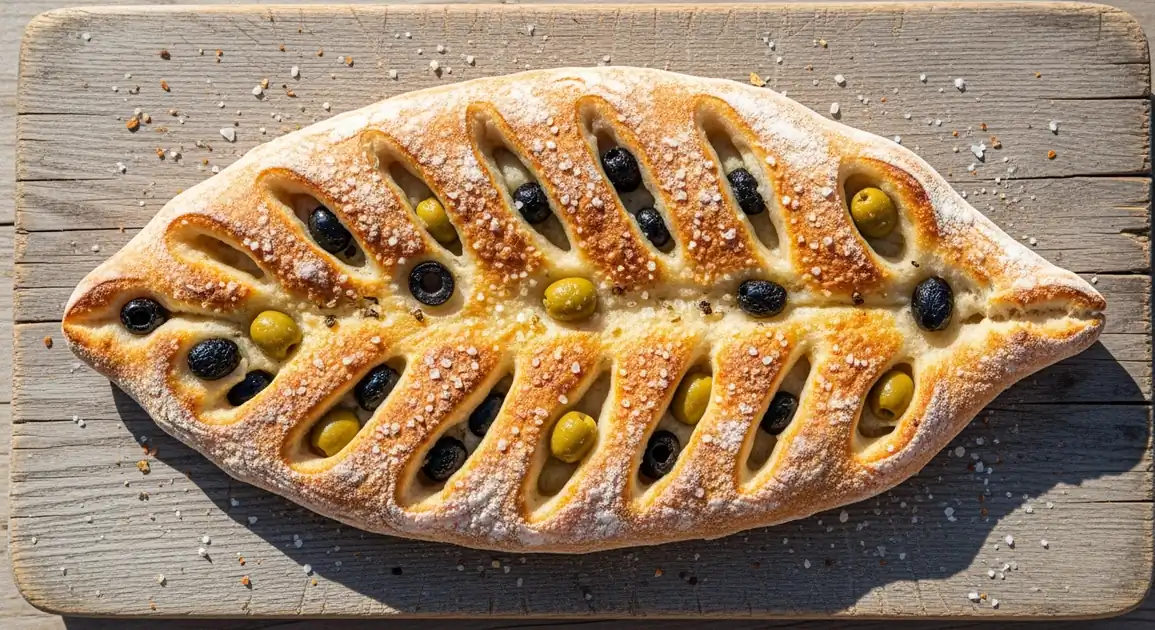Fougasse with Olives
Fougasse aux Olives

Description
In Marseille, Fougasse aux Olives is a readily available and much-loved local specialty found in countless boulangeries and markets. It embodies the city's Provençal roots and connection to Mediterranean flavors. Expect to find excellent versions featuring local olives and often fragrant with Herbes de Provence.
Dietary Information
Serving information
Serving style
Room temperature, torn to share. Perfect accompaniment to Marseille's seafood dishes, salads, or enjoyed on its own overlooking the port.
Quick facts
Typical Marseille Boulangerie hours: ~6:30 AM - 7:30 PM, often closed Sundays or Mondays, and may have a lunch break (approx 1 PM - 3 PM). Check specific bakeries.
Safety Tips
What to Look For
-
Crisp, golden-brown crust
Indicates it's freshly baked and not stale or undercooked.
-
Appears freshly baked (check bakery's schedule if possible)
Bakeries often bake multiple times a day; fougasse bought soon after baking is best.
-
Clean bakery environment
Ensure the bakery display cases, counters, and staff handling practices appear hygienic.
-
Pleasant smell of fresh bread and olives
A good indicator of fresh ingredients and proper baking.
What to avoid
-
Dry, hard, or pale crust
Signs of staleness or improper baking.
-
Fougasse left uncovered and exposed for long periods
While less critical than for moist foods, prolonged exposure can lead to staleness and potential contamination.
-
Visible signs of mold (rare on fresh bread)
Any visible mold means the bread should not be consumed.
-
Bakeries with poor overall cleanliness
General hygiene reflects on food safety standards.
Price information
Price range
Budget tips
- Bakeries in neighborhoods outside the main tourist center (Vieux Port) might be slightly cheaper.
- Market stalls can offer good value.
- A large fougasse can easily serve 2-4 people as a snack/starter.
Value indicators
- Crisp crust, chewy interior.
- Plenty of flavorful olives (local types like Picholine if specified).
- Good olive oil flavor, not greasy.
- Freshly baked smell.
Where to Find This Dish
Le Panier
Marseille's oldest district has charming squares and likely some traditional boulangeries.
Vieille Charité, Place des Moulins
Morning, Afternoon
Noailles
The vibrant Noailles market area has numerous food stalls and bakeries, offering a chance to find authentic versions.
Marché de Noailles, Rue d'Aubagne
Morning (market days), Afternoon
Cours Julien / La Plaine
Bohemian area with lively markets and artisan shops, including potentially good bakeries.
Cours Julien square, Place Jean Jaurès (La Plaine market)
Morning, Afternoon
Vieux Port (Old Port) surroundings
Numerous bakeries cater to locals and tourists around the Old Port area.
Vieux Port, Quai des Belges
Morning, Afternoon
Vendor Tips
- Look for bakeries with queues of locals – usually a sign of quality.
- Some bakeries might specify the type of olives used.
- Check closing times, especially for smaller neighborhood bakeries which might close earlier or for lunch.
- Consider buying from a stall at Marché du Prado or Marché Castellane on market days.
How to Order
Regional Variations
-
Use of Local Olives
(Utilisation d'Olives Locales)
Marseille bakeries might favor specific Provençal olive varieties like Salonenque or Picholine, impacting the flavor profile.
-
Stronger Herb Presence
(Présence d'Herbes plus Forte)
The use of Herbes de Provence might be more pronounced in Marseille fougasse compared to other regions.
-
Savory Variations
(Variations Salées Marseillaises)
Alongside olives, anchovy or cheese fougasse are also popular choices in Marseille bakeries.
Cultural context
History
Fougasse has ancient roots, believed to have originated in Roman times as 'panis focacius', a flatbread baked on the hearth (focus). It evolved across regions, with the Provençal version becoming distinctly associated with olive oil and often shaped to resemble a wheat stalk or leaf. Traditionally used by bakers to test oven temperature before baking loaves, it became a beloved bread in its own right, embodying the flavors of Southern France.
Local significance
Fougasse is a taste of home for Marseillais and a fundamental part of local Provençal cuisine. It's simple, satisfying, and versatile.
Eating customs
- Sharing is key.
- Pairs well with local rosé wine.
- Enjoyed outdoors whenever possible.